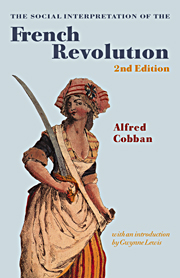Book contents
- Frontmatter
- Contents
- PREFACE
- KEY TO REFERENCES
- INTRODUCTION TO THE SECOND EDITION BY GWYNNE LEWIS
- I THE PRESENT STATE OF HISTORY
- II HISTORY AND SOCIOLOGY
- III THE PROBLEM OF SOCIAL HISTORY
- IV THE MEANING OF FEUDALISM
- V THE ATTACK ON SEIGNIORIAL RIGHTS
- VI WHO WERE THE REVOLUTIONARY BOURGEOIS?
- VII ECONOMIC CONSEQUENCES OF THE REVOLUTION
- VIII A BOURGEOISIE OF LANDOWNERS
- IX COUNTRY AGAINST TOWN
- X SOCIAL CLEAVAGES AMONG THE PEASANTRY
- XI THE SANS-CULOTTES
- XII A REVOLUTION OF THE PROPERTIED CLASSES
- XIII POOR AGAINST RICH
- XIV CONCLUSION
- INDEX
VIII - A BOURGEOISIE OF LANDOWNERS
Published online by Cambridge University Press: 05 June 2012
- Frontmatter
- Contents
- PREFACE
- KEY TO REFERENCES
- INTRODUCTION TO THE SECOND EDITION BY GWYNNE LEWIS
- I THE PRESENT STATE OF HISTORY
- II HISTORY AND SOCIOLOGY
- III THE PROBLEM OF SOCIAL HISTORY
- IV THE MEANING OF FEUDALISM
- V THE ATTACK ON SEIGNIORIAL RIGHTS
- VI WHO WERE THE REVOLUTIONARY BOURGEOIS?
- VII ECONOMIC CONSEQUENCES OF THE REVOLUTION
- VIII A BOURGEOISIE OF LANDOWNERS
- IX COUNTRY AGAINST TOWN
- X SOCIAL CLEAVAGES AMONG THE PEASANTRY
- XI THE SANS-CULOTTES
- XII A REVOLUTION OF THE PROPERTIED CLASSES
- XIII POOR AGAINST RICH
- XIV CONCLUSION
- INDEX
Summary
It must not be supposed, though Georges Lefebvre did, that I am trying to deny the existence of the French Revolution; I merely want to discover what it was. Professor Reinhard has argued that even if we discard the view that the revolution was against feudalism', still the struggle against seigniorial rights, against the noblesse and against the privileged classes was central to it. This may have been true in the summer of 1789. Is it true of the next ten years? Seigniorial rights were largely eliminated in 1789, and their elimination was completed by the stubborn resistance of the peasantry, despite the reluctance of the revolutionary authorities in Paris, in the course of the following years. Similarly, noblesse was legally brought to an end—even if only for 14 years—in 1789, as the marquis de Ferrières philosophically observed on 20 June 1790. ‘Noblesse’, he writes, ‘is already destroyed in fact. The abolition of feudal rights and justice, equality in the division of enclosed land, have given it a mortal blow.’ Do not write to me any longer as M. le marquis, he instructs his wife; and let my daughter and son-in-law stop being called count and countess. He even asks for his family arms in the local church to be obliterated, though, since Ferrières was a cautious man, only with whitewash. Finally, privileges based on order, heredity and so on were ended by the legislation of 4–11 August 1789. There was no need, then, to continue the revolution to abolish what had already been abolished.
Yet the revolution did continue, and it continued particularly as a struggle against the ‘aristocrats’ and ‘aristocracy’.
- Type
- Chapter
- Information
- The Social Interpretation of the French Revolution , pp. 81 - 90Publisher: Cambridge University PressPrint publication year: 1999



